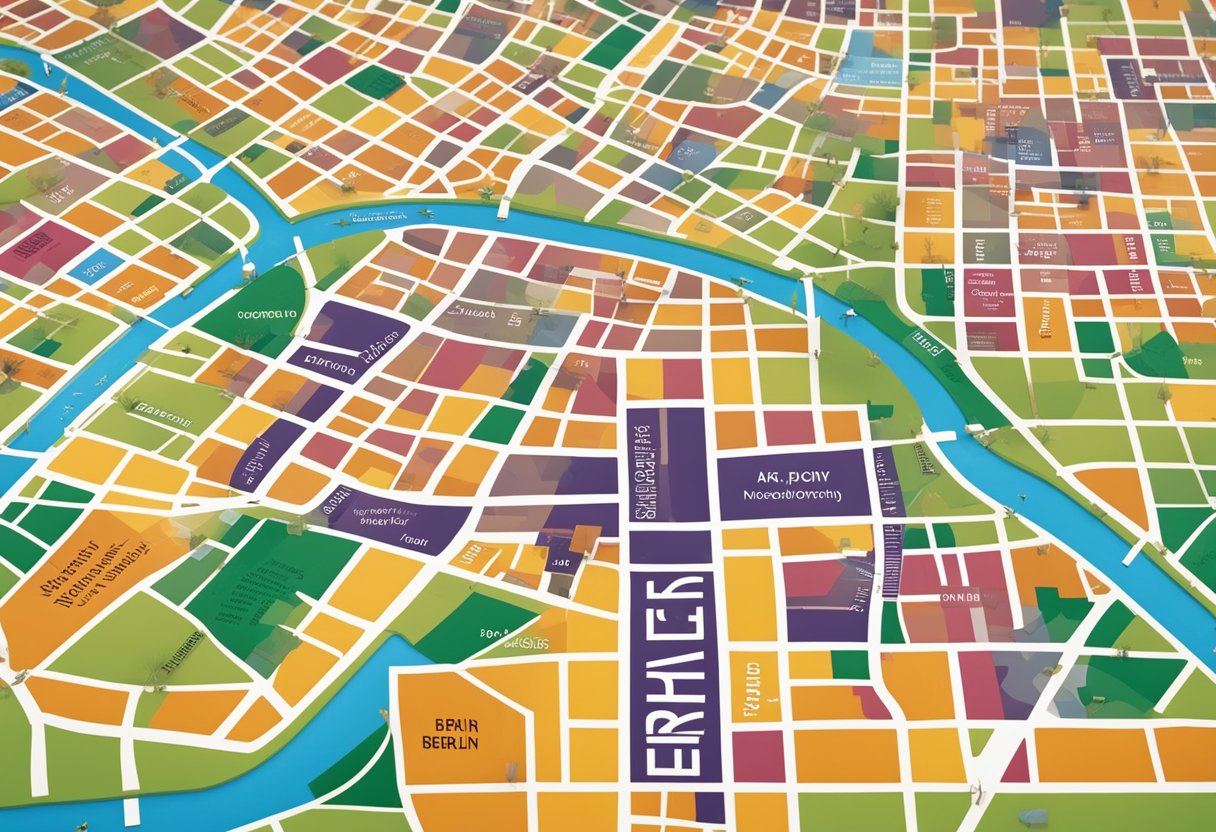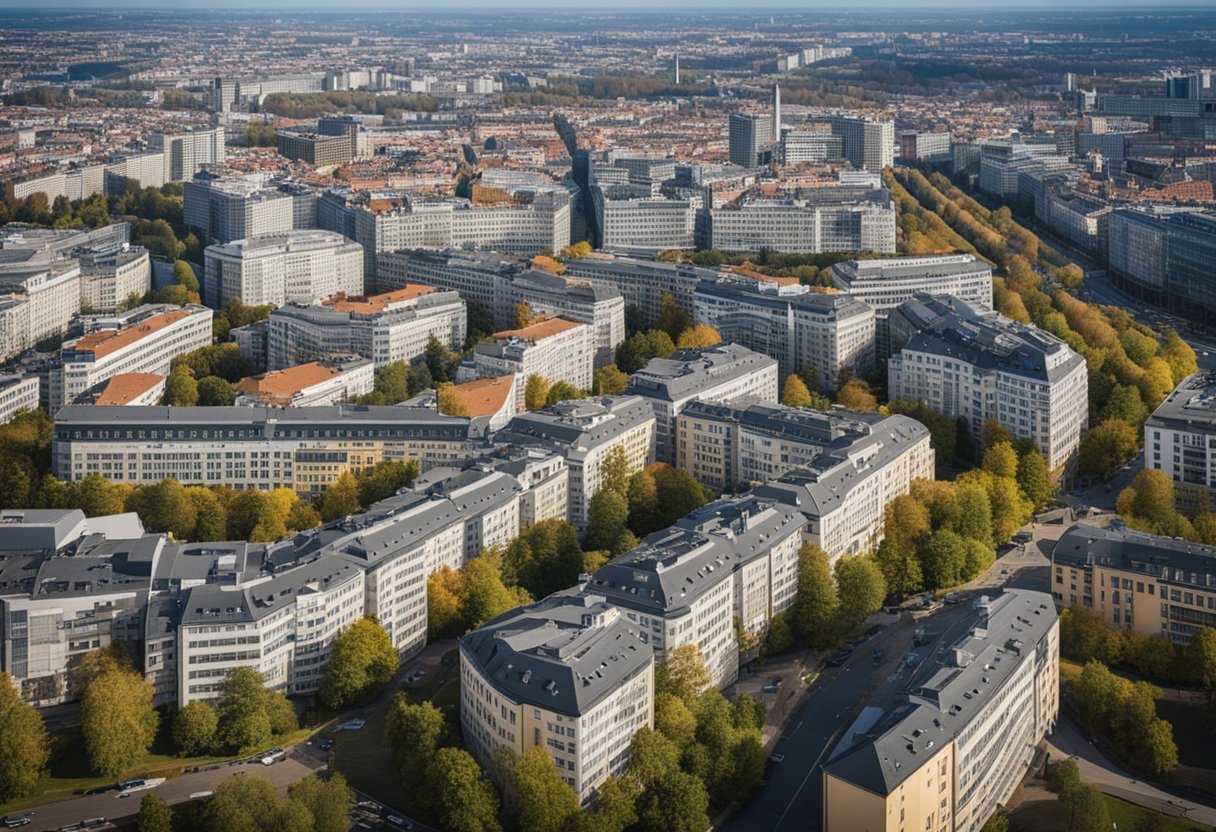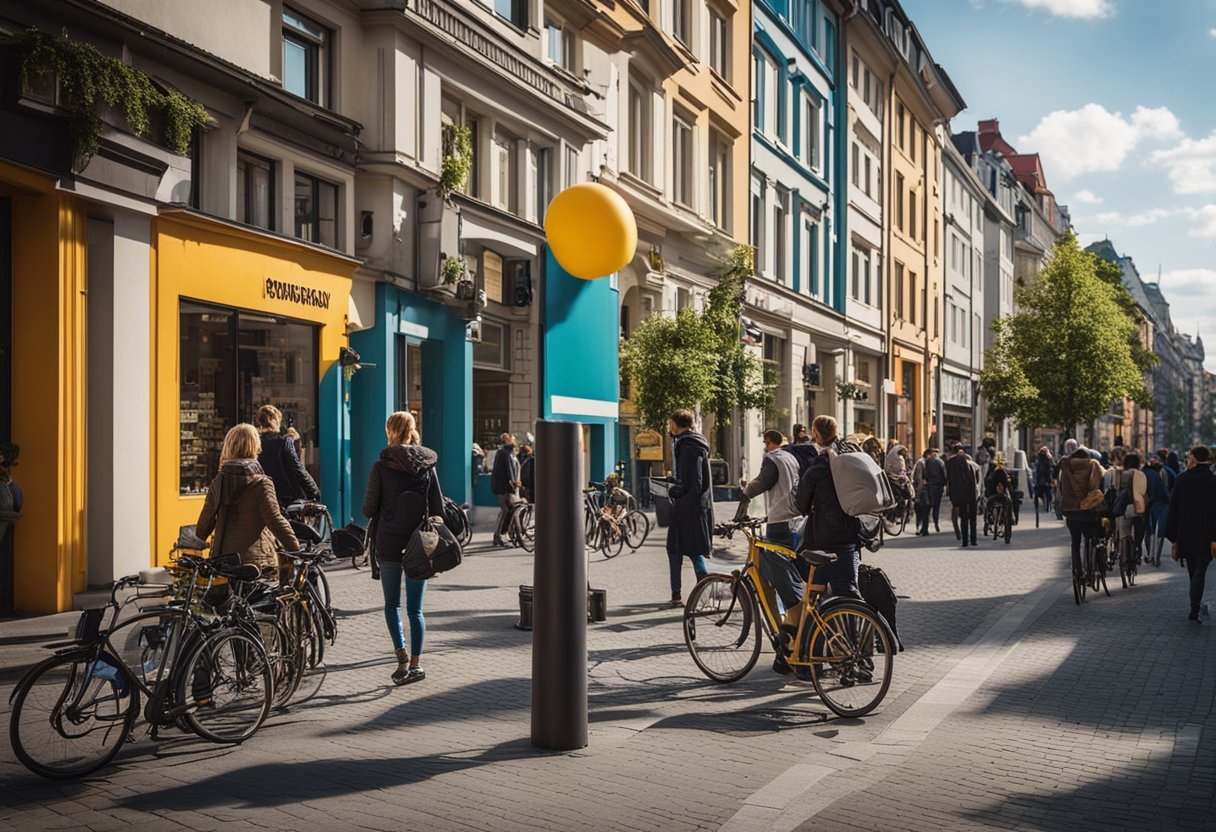Berlin, Germany’s capital city, is a hub of culture, politics, and history, which makes it an attractive destination for expats, students, and professionals from around the world.
As a result, the housing market in Berlin has been under considerable pressure, reflecting in the rental prices of apartments. The average rent in Berlin varies widely depending on the district, type of housing, and amenities included.
A blend of historical buildings and modern developments provides potential renters with a variety of options, from renovated pre-war apartments to newly built complexes.

The cost of renting in Berlin, similar to many major cities, has seen a significant increase over the years. A 1 bedroom apartment in the city center is likely to cost more compared to those in the outskirts.
For a more spacious living accommodation, the average cost of an apartment or house will be higher, influenced by location, size, and condition of the property. Understanding these variations in rent can help individuals budget accordingly and set realistic expectations when searching for housing in Berlin.
Overview of Berlin’s Rental Market-Average rent in Berlin

Berlin’s rental landscape is shaped by diverse factors including legislation, district variations, and European comparisons. Tenants encounter a blend of warmmiete and kaltmiete pricing distinctions while navigating a market with fluctuating rents and additional costs.
Current Trends in Berlin’s Housing
The housing market in Berlin has faced significant changes, where recent reports suggest a slight downturn in real estate prices. Current trends show a dynamic shift in rental costs, with the average rent in selected districts like Neukölln and Mitte experiencing notable variations.
Impact of Recent Historical Data
Between 2019 and 2021, the Berlin housing market was characterized by rising rents. However, after a peak period, the market is seeing different trends with an adjustment in prices which might reflect changes in the population dynamics or economic factors.
Differences by District
The Berlin rental market is distinct across various districts. For instance, areas such as Pankow, Treptow-Köpenick, and Reinickendorf exhibit disparate rental costs, with variations influenced by factors like location desirability and available amenities.
Comparative Rent Prices in Europe
Berlin’s average rent prices are competitive when compared to other major European cities such as those in Italy and the United Kingdom, often presenting a more affordable option for tenants when assessed in euros per square meter.
Legislation and Rent Control Measures
Recent years have seen attempts to implement rent control measures in Berlin, with policies like the “Mietendeckel” aiming to curb rent increases, but the effectiveness and permanence of such legislation carry ongoing debates.
Apartment Types and Sizes
Berlin offers a range of apartment types and sizes, with furnished apartments often demanding higher rental costs. Determinants such as the number of rooms and the apartment’s condition significantly impact the rental price.
Understanding Warmmiete vs. Kaltmiete
Rent in Berlin is often advertised as either warmmiete, which includes utilities, or kaltmiete, which does not. Tenants need to carefully consider the distinction between these two forms of rental pricing when budgeting for housing costs.
Additional Rental Fees and Deposits
Additional rental fees, known as nebenkosten, customarily cover building maintenance and other services. Additionally, tenants are usually required to pay a security deposit, which is typically refundable, provided the property is left in good condition.
Rental Contracts and Insurance
Rental contracts in Berlin are legally binding and outline the terms of tenancy, including obligations on both the landlord and tenant. Renters commonly also procure liability insurance to protect against damages during their tenancy.
Cost of Living in Berlin

The cost of living in Berlin encompasses a variety of expenses ranging from housing to healthcare. A significant portion of a resident’s budget is usually allocated towards rent, with other considerable monthly expenses including utilities, transportation, and groceries.
Average rent in Berlin for Residents
Rent is a substantial part of monthly expenses in Berlin. For a one-bedroom apartment, residents may spend between €700 to €1,500 per month, whereas larger apartments are relatively less per square meter.
A more detailed insight into rent prices in Berlin indicates a room might cost between €400 to €900 monthly and an apartment can vary greatly depending on location and size.
Utilities and Additional Costs
Monthly utility costs, which include heating, electricity, water, and garbage services, can average around €200 to €300 for an 85m² apartment. This does not encompass the tv tax, which is mandatory for each household.
An important part of managing a budget is planning for these additional costs to effectively save money.
Transportation Costs in Berlin
For getting around the city, a monthly pass for public transportation is approximately €86.
This pass grants basic access across various modes of public transport, providing a cost-effective option for residents to manage their transportation expenses without the need for a personal vehicle.
Groceries and Market Prices
Residents typically allocate around €250 per month for groceries. Products like milk, eggs, and chicken fillets are relatively affordable, and so are fresh produce like apples, tomatoes, and potatoes.
Occasional indulgences like a mid-range bottle of wine might cost about €6. Information on grocery prices helps residents plan their monthly expenses effectively.
Dining and Entertainment Expenses
Dining out and entertainment can vary greatly but expect to pay about €8 for a domestic beer and around €3 for a cappuccino in a restaurant. A ticket to the cinema might cost around €12, which needs to be accounted for in discretionary spending.
Communications and Internet Charges
Internet and mobile phone costs can be quite reasonable, with basic internet plans starting around €30 per month. Maintaining communications is essential, and these charges are a staple in the monthly budget.
Childcare and Education Costs
Childcare and preschool expenses can significantly impact a family’s budget. Expect to pay about €300 per month for childcare, although prices can fluctuate based on the quality and location of the service.
Healthcare and Insurance Costs
Maintaining a health insurance plan is necessary for basic access to healthcare services.
Health insurance premiums may vary, but on average, statutory health insurance can cost around €300 to €800 monthly, depending on income levels. Private healthcare options are available but generally cost more.
Factors Influencing Rental Prices

Rental prices in Berlin are subject to a variety of factors, each playing a significant role in how rents are set and adjusted. Understanding these influences provides insight into why rent levels are where they are.
Supply and Demand in the Housing Sector
The interplay between supply and demand is a fundamental determinant of rental prices in Berlin. A limited housing supply amid a growing population leads to higher demand, consequently pushing up the average rent.
For instance, a one-bedroom apartment in the city can cost about €853 per month. An increase in housing construction can help stabilize or reduce rents if it keeps pace with demand.
Economic Indicators and Rent Fluctuations
Economic factors such as interest rates and mortgage interest rates significantly impact rental prices. Higher rates can lead to more expensive mortgages, which may translate into higher asking rents as landlords aim to cover their costs or seek a premium on their real estate investment.
The Role of Real Estate Investment
Investment trends in the residential real estate market influence rental prices. Increased construction activity and real estate purchases by both domestic and foreign investors can raise property values and, consequently, rent costs. A high rate of investment often coincides with a rise in the quality and price of available apartments.
Student Housing and Shared Apartments
In Berlin, the cost of student housing and the sharing of apartments can reflect the more affordable segment of the market. As many students and low-income residents opt for shared living spaces to cope with the average rent, the rates in this sector are typically lower than individual apartments, affecting the overall rental landscape.
Demographic Changes and Migration
Demographic changes and migration patterns have a direct effect on housing demand and rents. A rising population due to migration can increase the demand for apartments, leading to higher rents. Conversely, areas with shrinking populations may see a decline in rent prices as the demand decreases.
The average cost of an apartment in Berlin has shown a notable increase, where flats were offered for an average of €5,817 per square meter in recent times, indicating a significant rise in the average cost of housing in the city.
Strategies for Finding Affordable Average rent in Berlin

Securing affordable housing in Berlin’s competitive rental market requires a strategic approach. With the average rent on the rise, renters must employ effective methods to find housing that aligns with their budget.
Research and Comparison
Berlin’s housing market varies greatly by district, necessitating a thorough comparison of rental costs. Prospective renters should study statistics on average rents in desired areas to set realistic expectations.
Websites that provide up-to-date rental costs data offer invaluable insights, enabling informed decisions.
Negotiating Rental Agreements
Leverage in negotiating rental agreements can often result from understanding the local market. Knowledge of rent increase trends can be a significant advantage. It’s also possible to negotiate terms such as lease duration and included utilities, which can lead to long-term savings.
Long-term Planning to Save Money
Committing to longer lease terms often results in lower rental costs. Landlords in Berlin may offer better rates for extended leases, providing stability in the rent increase landscape.
Renters should assess their long-term budget and income to secure favorable deals that align with their financial planning.
Exploring Different Districts for Better Rates
The rent in Berlin differs across districts. Exploring outside of populous areas like Mitte could lead to more affordable options. Districts like Neukölln, Pankow, Treptow-Köpenick, and Reinickendorf often have varying prices, with some offering better rental costs while still maintaining quality of life.
Frequently Asked Questions

When considering the move to Berlin, understanding the average rent and related living expenses is crucial for budgeting and financial planning.
How does the cost of living for a student in Berlin compare to other expenses?
For students in Berlin, rent often constitutes a significant portion of their monthly expenses. Compared to other costs such as food, transportation, and academic materials, housing can be a substantial financial burden, especially in more central or popular neighborhoods.
What are the average monthly housing expenses one could expect when living in Berlin?
The average rent for an apartment in Berlin can vary, but it’s not uncommon for a one-bedroom apartment to be rented out at approximately €23.25 per square meter. When considering additional costs like utilities and internet, the total monthly expense can increase accordingly.
What salary should someone aim for to live comfortably in Berlin?
To live comfortably in Berlin, individuals should strive for a salary that accommodates the living expenses typical of the city. With average rents rising, a gross monthly income of at least €3,000 to €3,500 would be a prudent aim to cover rent, social activities, and savings.
How does the cost of renting a home in Berlin contrast with the average rent across Germany?
Berlin’s rental prices have historically been lower than other major German cities. Even with recent increases, the average rent in Berlin tends to be more affordable than in cities like Munich or Frankfurt, where prices per square meter can be substantially higher.
For an international student, what should be budgeted for housing in Berlin?
International students should budget for housing accordingly, considering the average rent in Berlin is around €749 for rooms and €1,680 for apartments. It’s advisable to allocate a bit more to cover the security deposit, which is typically three times the cold rent.
In terms of housing costs, how does Berlin’s living expenses compare with those in the US?
Berlin’s housing costs are generally lower than in large US cities like New York or San Francisco but can be comparable to or slightly higher than mid-sized American cities. The average rent for a mid-range apartment in Berlin could be considered affordable for those accustomed to the US housing market.